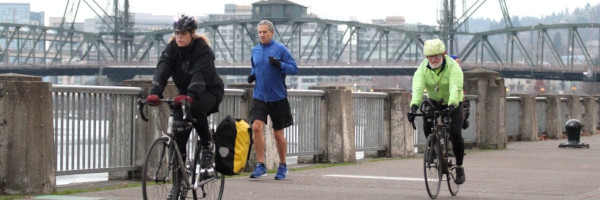TNL to support Portland, OR, in gathering crucial traffic data for 2030 bicycling plan
| News | |
|---|---|
| Image | 
|
| Published | 2023-07-06 |
| Point(s) of Contact | Paul Hoekstra |
| Organization(s) | TNL |
| Where | Portland OR |
| Display | Yes |
Portland, Oregon, has been known as the best bicycling city in North America for a long time. The city has taken its engineering steps a bit further by evaluating the TNL’s FlowCube advanced traffic sensor technology. The FlowCube is yielding valuable data to support the city’s traffic management.
When it comes to bicycling, Portland, Oregon, prides itself in a veritable bicycling legacy. Even as early as 1996, the city adopted a Bicycle Master Plan. Today, the results of the bike-friendly policy are clearly visible. The city is the central hub of a connected regional bicycle network that includes bike lanes, paths, trails and greenways, as well as protected bikeways separated from traffic on busy streets.
- Portland Bicycle Plan for 2030
In its Bicycle Plan for 2030, Portland sets its aims even higher. The bicycle is to become a critical component of the city’s overall transportation system. As the plan describes it, “A Portland with the bicycle as a pillar of its transportation is truly a beautiful city.”
With the Portland Bicycle Plan for 2030, Portland will be cleaner and healthier, as bicycling creates safer streets, reduces the causes of global climate change, and limits the effects and health care costs related to inactivity. Bicycling creates fun, vibrant, and livable neighborhoods. It provides equity and access to viable, affordable transportation options, and it supports Portland’s economy.
- TNL's FlowCube – an intelligent traffic sensor
As part of the implementation of the bicycle plan, the Portland Bureau of Transportation (PBOT) has incorporated detector confirmation and countdown to green at the bicycle signals at select locations along its SW Naito Parkway Improvement Project – a first in the USA. The new addition to the traffic signal aims to improve the general bicycling experience, as well as reduce red light violations. For this end, TNL's FlowCube traffic sensor was implemented at several intersections. The FlowCubes provide PBOT with the following crucial insights:
- Before deployment of the countdown traffic lights - Baseline analysis of red-light violations by bikes and pedestrians
- Passage counts of all traffic modes (cars, bicycles and pedestrians) for different intersections
- Travel times per traffic mode over the main corridor
- Spillback detection for an on-ramp at SW Jefferson Street towards the Hawthorn Bridge
- Red light violations by pedestrians and bicyclists at SW Jefferson
The FlowCube sensor is a compact cellular-based AI edge device for detecting and classifying all different modes of traffic. It is highly adaptable and configurable, making it the ideal tool for collecting reliable traffic data of any kind. FlowCube is fully compliant with all privacy laws. No visual data is stored and analysis is performed immediately on the sensor, so that complete anonymity is guaranteed. The FlowCube’s configurable dashboards have been tailored to the specific needs of PBOT. Beside installing, implementing and configuring 10 FlowCubes at 5 intersections, TNL has also supported PBOT with the sourcing of traffic lights and tailoring the dashboards.
- About TNL
TNL is a 35-year young international firm and the market leader in mobility solutions in Europe. Like Amsterdam and Rotterdam in The Netherlands, Oslo in Norway, and Copenhagen in Denmark, our USA clients are the leading cities in multi-modal traffic flow and public transit service levels. We are proud to be instrumental in establishing and delivering those world-renowned transit and mobility services to the citizens and businesses in the USA.